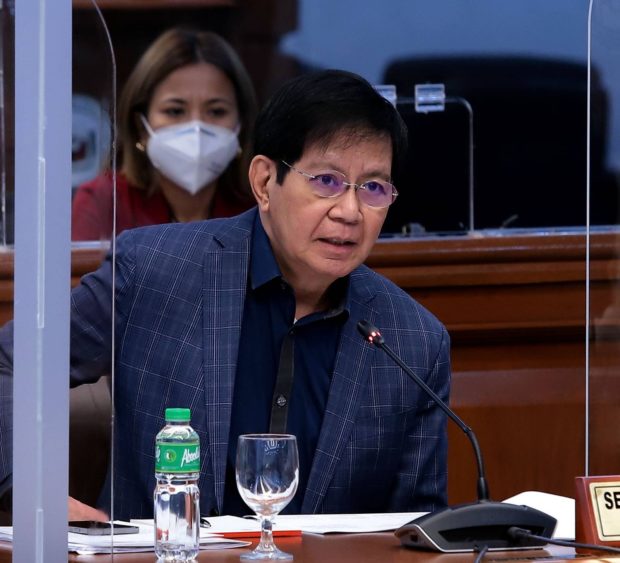Lacson marks DBM’s ‘pattern’ of withholding Congress-okayed fund releases

INVENTORY OF REWARDS: Sen. Panfilo Lacson, during the hybrid meeting of the Committee on National Defense of the Commission on Appointments (CA) on the ad interim appointments and nomination of 50 senior military officers Wednesday, October 28, 2020, calls for an inventory of all rewards that should have been awarded to military informants. Lacson made the call after learning that the $1 million-reward pledged by the United States (US) for the capture of expert bombmaker Abdul Basit Usman has not yet been awarded to the informant. “Maybe we should coordinate with the Department of Foreign Affairs to call out, pardon me for using that word, the US through the embassy as to why the reward has not been given as pledged,” Lacson said. Usman, who is responsible for a series of bombings in Mindanao that killed a number of victims, was killed in an encounter with the Moro Islamic Liberation Front (MILF) in May 2015. (Albert Calvelo/Senate PRIB)
MANILA, Philippines — Senator Panfilo Lacson on Wednesday noted an alleged “pattern” by the Department of Budget and Management (DBM) of withholding the release of fund augmentations proposed and approved by Congress in this year’s national budget.
According to Lacson, this DBM action renders the legislature’s role in the budget process “inutile” and “useless” as it also weakens the legislative branch’s “power of the purse.”
“I will raise an issue out of this na ang ginawa kasi ng DBM, napaka-deliberate ‘yung basta’t congressional initiative they tag those amendments for FLR or for later release,” Lacson said in an online interview with reporters.
(I will raise an issue out of this that what the DBM did, it’s very deliberate, that if an appropriation is a congressional initiative, they tag those amendments for FLR or for later release.)
“’Pag sinabing ‘for later release,’ ire-release dapat pero alam naman natin at alam din nila na ‘pag for later release ka, hindi na ‘yan mare-release,” he added.
Article continues after this advertisement(When you say ‘for later release,’ that should be released but we know and they know that if an appropriation is tagged as ‘for later release,’ it would not be released.)
Article continues after this advertisementLacson explained that congressional initiative funds are those introduced by lawmakers during the budget process to augment appropriation for certain agencies.
While he did not specify how much, Lacson said a “substantial” amount of FLR funds were initiated by Congress.
“Parang nadi-diminish, if not rendered irrelevant, ‘yung power of the purse, the authority of Congress to participate in the budget process. Kasi kung lahat na lang ng congressional initiatives—regardless kung ito’y individual insertions or institutional amendments—tatanggalin ng DBM, para san pa ‘tong ginagawa namin ngayon?” the senator said.
(It’s diminishing, if not rendered irrelevant, the power of the purse, the authority of Congress to participate in the budget process. Because if all congressional initiatives—regardless if it’s individual insertions or institutional amendments—the DBM will remove it, then why are we even deliberating the budget?)
“Bakit pa kami nagre-review ng National Expenditure Program kung at the end of the day when finally the President has already signed the General Appropriations Act eh hindi din ire-release lahat ‘yung conrgessional initiatives. So rendered inutil ‘yung role ng Congress dun sa budget,” he added.
(Why are we even reviewing the National Expenditure Program if at the end of the day when finally the President has already signed the General Appropriations Act, all the congressional initiatives are not released. So, the role of Congress in the budget is rendered inutile.)
Lacson cited as an example the 2020 budget of the Department of Information and Communications Technology (DICT) wherein he augmented its appropriations by P11 million to support its national broadband program.
“Ang nangyari hindi ni-release,” he lamented
(What happened is that it was not released.)
“Basta’t ang pattern na nakita namin, as long as makita nilang conrgessional initiative, parang automatic na ‘yung for later release,” he added.
(The pattern that we saw is that as long as they see that it’s a congressional initiative, it is automatically tagged as ‘for later release.’)
While Lacson understands the DBM had to realign some funds for the government’s COVID-19 response, he said it should have just requested the departments to submit a list of projects they could not implement and pull the budget from there.
“Pandemic ngayon, hindi normal ‘yung condition natin pero dapat tinanong muna nila ‘yung mga agencies: ‘Magsubmit kayo ng mga listahan ng mga projects na mahihirapan kayong ma-implement para ito ‘yung ma-‘for later release’ natin para ma-realign for the needs of the pandemic,” he said.
(We are in the middle of a pandemic, we are not in a normal condition but they should have asked the agencies: ‘Submit a list of projects you cannot implement so that we can realign funding for these projects for the needs of the pandemic.)